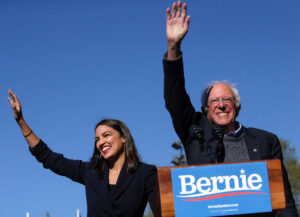A mere glance at the headlines underscores what most working people under 40 intuit. Unfathomable wealth inequality, flat or barely improving wages, falling life expectancy, and a massive housing shortage are overturning the hard-won gains of the 20th century. And there has only been halting progress toward reform in most of the West. Sweeping proposals by progressives have been undermined by their inability to discard identity politics dogma and build a large tent. On the Right, meanwhile, steps toward supporting family subsidies and industrial policy — issues once prioritised by the post-war Left — have been half-hearted.
Exacerbating this stalemate are debates over what type of reform is necessary: whether investments like reindustrialisation or more welfare programmes are most urgent; whether an active state can solve the crisis of development; and whether a global wealth tax is preferable to protectionist experiments in “deglobalisation”. Bidenomics seems to have had little ripple effect across the West, while Kamala Harris and Donald Trump make only vague promises about economic growth.
Our challenges are, however, only the latest iteration of an age-old problem. As captured in David Lay Williams’ new book, The Greatest of All Plagues, the social, political, and economic costs of gaping inequality have preoccupied an eclectic range of philosophers over millennia — from Plato to Marx via Jesus, Hobbes, Rousseau, Adam Smith and J.S. Mill. Broadly agreeing that it is both a material and spiritual problem, Williams’ thinkers confront us with powerful arguments against inequality: it degrades civilisation because it rewards greed at the expense of the community, ultimately destroying any basis for social cooperation and respect for the rule of law. Yet for nearly all of these philosophers, maintaining civic virtue and the public good must be central to any project that might fundamentally reduce inequality. This distinguishes them from many modern progressives, whose preoccupation with group identities and historical injustices ultimately precludes a coherent vision of what might reverse inequality’s baleful effects. If today’s reformers are to truly mobilise the public, they must identify, as these philosophers did, what it is about society that they aim to conserve.
Fear of disunity that spills into violent civil strife is a frequent theme throughout the book. When citizens no longer view the law as just and impartial, these philosophers warn, factionalism increases. Summarising Hobbes, who is not exactly known for trumpeting the holistic benefits of civic welfare, Williams writes that “a commonwealth tolerating needless hunger flirts with its own demise”. The deleterious effects of greed, or pleonexia, however, extend beyond the collapse of law and order. Rousseau observes that it destroys compassion, leaving the destitute yet more helpless and loathed. As he writes of the poor man: “all free assistance flees him when he needs it, precisely because he lacks the means to pay for it.” The poor, in turn, succumb to the same miserly outlook of those who rule unjustly.
Here is one of the most important insights in Williams’ book: widespread resignation to these conditions amongst the working classes ultimately enervates the human desire for liberty. Some readers may point to modern-day philanthropy to suggest that all-consuming greed is not an inexorable force which destroys virtue among the elite. Yet according to Rousseau and Mill, the spiritual violence of extreme inequality isn’t mitigated by a spurt of good deeds. On the contrary, Rousseau writes that the poor lose their freedom when they become dependent on the rich. Similarly, Mill stresses that poverty breeds dependency, obstructing the talents which propel human development. This is a situation that cannot be easily remedied through compensatory measures.
Attempts to soften inequality through philanthropy must therefore be scrutinised: do they raise the general welfare whilst empowering the individual to make their own way, or do they place those desperate for work and bread at the utter mercy of elites? From Mill’s perspective, there were mental and moral benefits of individual achievement. Therefore, if he was immensely sceptical of private charity, regarding the Victorian economy as one based on “conquest and violence”, it is doubtful he would have endorsed state socialism of the kind experienced in Eastern Europe.
Instead, Mill advocated a mix of pragmatic and radical reforms, including estate taxes, widespread but decentralised education, worker cooperatives, property redistribution, and some form of guaranteed subsistence. His primary objective — to eradicate poverty and foster individual opportunity — reflected his utilitarian sentiments. This was a philosophy of broad enablement in a time of still rigid hierarchy. Unlike Smith, who believed the fruits of economic growth and doux commerce between nations would be enough to alleviate poverty, Mill thought active state policy was necessary. In these respects, Mill anticipated some of the guiding principles of New Deal liberalism and social democracy.
The appeal of such reformism has waxed and waned in our own era of slack growth. Many young people despair that the government appears unwilling or unable to reinvest in what the post-war generation took for granted. Drawing inspiration from Marx, some believe that only the threat of revolution can compel the government to once again subordinate vested interests to the public interest. But the modern Left’s ability to rouse the public has been largely ephemeral. A grassroots focus on inequality and austerity largely peaked in the middle of last decade, giving way to demands to centre identitarian issues that seemingly mattered most to a diversifying electorate. Needless to say, this course has not realigned Western politics in favour of a new, more egalitarian social contract.
Part of the Left’s ineffectiveness reflects the pessimism of our times. But it also stems from a deep reluctance, in the 21st century, to affirm the universality of the principles which Williams’ thinkers used to make sense of their world. In particular, the idea of the whole is as open-ended and contested as ever. As a kind-of revisionist, anti-Western outlook pervades the Left, it would appear many activists do not want to conserve much of anything. This contrasts with an older social-democratic tradition more in tune with Enlightenment thought. Consequently, few on the Left appear to agree on what a radically egalitarian economy would look like. Would it resemble, for instance, the autarkic community envisioned by Rousseau, or would such “withdrawal” from the world stage be inegalitarian in an already globalised and interconnected world? Would a “post-capitalist” economy affirm the republican freedom envisioned by Marx, or would it impose austere measures to limit climate change? And if the latter, would such a surveillance state in the name of global justice derail innovation while stifling development in poorer countries?
These are not merely academic debates. For example, industrial policy — the main way in which the Democratic Party has tried to address America’s socioeconomic divide, and which other centre-left parties such as Keir Starmer’s Labour have entertained — has antagonised parts of the Left due to its intrinsic economic patriotism. Some believe that China is now best poised to catalyse the global clean tech revolution, while others advocate a process of radical “degrowth” for the West that would make most households poorer. And yet, amid worrying signs of stagnation and low social trust, it would seem incumbent on policymakers to kickstart a new era of development.
Of course, a national wealth tax as proposed by Senator Elizabeth Warren, or a global one, as envisioned by Thomas Piketty, would certainly go some way toward compressing wealth inequality. But there are legitimate questions over how such taxes would be best used to address the widespread decline in upward mobility and life chances. If they went toward a basic income, would that actually solve the social problems that are symptomatic of extreme inequality? Would that, in turn, lead to a new kind of political complacency over concentrated wealth and power? Charity, as Williams’ book underscores, does not address the root causes of indigence. There are sound reasons from a Left-wing perspective to be wary of solutions that do not facilitate the mix of freedom and development that both Mill and Marx advocated.
These are just some of the issues that loom for those who are inclined toward radicalism but still believe in democracy. As The Greatest of All Plagues suggests, tackling inequality is never so direct as levelling the power of the ultra-wealthy, even if a government were elected with this express purpose. It requires navigating the contradictions which have bred social conflict throughout history. Security, freedom, progress, and fairness: these are among the most essential values which continually animate politics, but they are hard to hold in equilibrium. This is especially true of modern liberal democracies, which, for all their flaws, have accommodated an unparalleled degree of change and pluralism.
Some observers may darkly wager that this pluralism is on the wane and that an age of oligarchy is already upon us. If the most extreme antagonisms theorised by Marx are to be avoided, then society must at the very least strive to balance liberality with common purpose. Still, the central lesson is as clear as day. Rebuilding that social trust unequivocally depends on a restoration of the public good, and thus putting an end to the extreme inequality which imperils all. A democratic Left that has any hope of realising a better world must not lose sight of this historical mission.
Disclaimer
Some of the posts we share are controversial and we do not necessarily agree with them in the whole extend. Sometimes we agree with the content or part of it but we do not agree with the narration or language. Nevertheless we find them somehow interesting, valuable and/or informative or we share them, because we strongly believe in freedom of speech, free press and journalism. We strongly encourage you to have a critical approach to all the content, do your own research and analysis to build your own opinion.
We would be glad to have your feedback.
Source: UnHerd Read the original article here: https://unherd.com/




